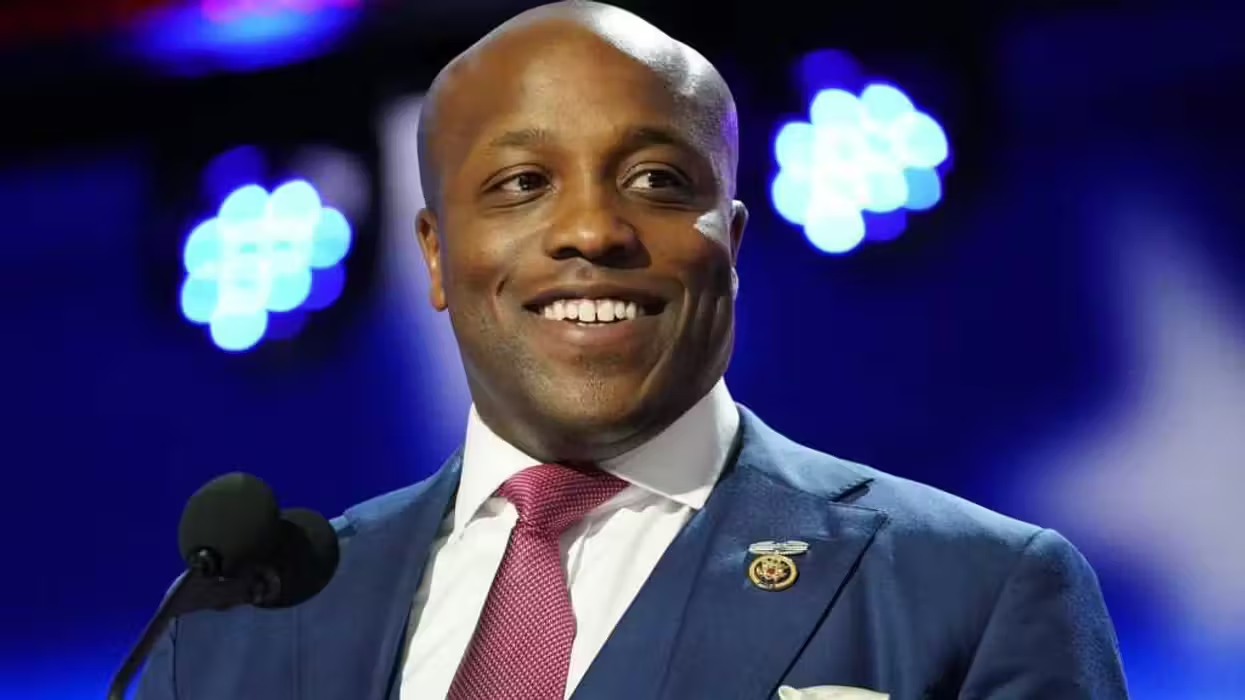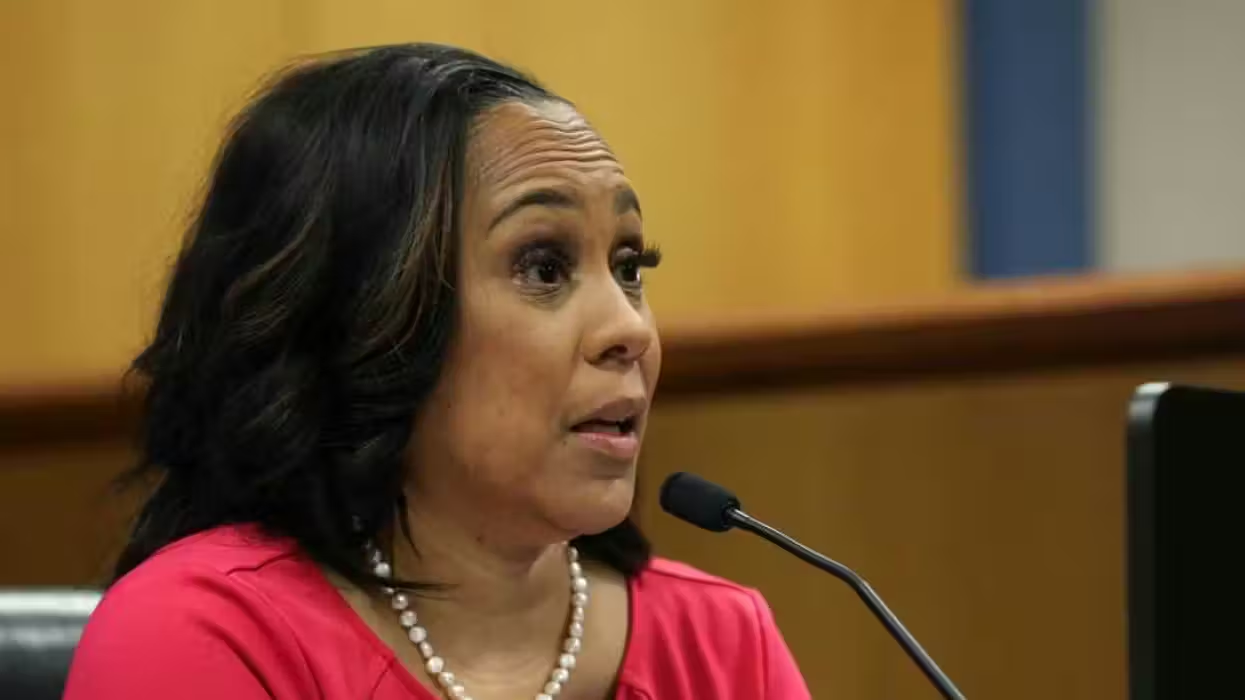SALT LAKE CITY (TheBlaze/AP) — The Mormon Church is pushing back against a misconception it says has been spread by pop culture: that members of the faith are taught they'll get their own planet in the afterlife.
The idea has been popularized by the Broadway show "The Book of Mormon," but the church is now hoping to correct the misconception.
A newly posted article affirms the faith's belief that humans can become like God in eternity, but says the "cartoonish image of people receiving their own planets" is not how members of The Church of Jesus Christ of Latter-day Saints envision it.
"While few Latter-day Saints would identify with caricatures of having their own planet, most would agree that the awe inspired by creation hints at our creative potential in the eternities," the article says.
 In this undated file image released by Boneau/Bryan-Brown, from left, Rema Webb, Andrew Rannells and Josh Gad perform in "The Book of Mormon" in New York. (AP/Boneau/Bryan-Brown, Joan Marcus)
In this undated file image released by Boneau/Bryan-Brown, from left, Rema Webb, Andrew Rannells and Josh Gad perform in "The Book of Mormon" in New York. (AP/Boneau/Bryan-Brown, Joan Marcus)
The expectation of exaltation is more figurative and ambiguous than boiling it down to living on one planet, it says.
"A cloud and harp are hardly a satisfying image for eternal joy, although most Christians would agree that inspired music can be a tiny foretaste of the joy of eternal salvation," the article reads. "Likewise, while few Latter-day Saints would identify with caricatures of having their own planet, most would agree that the awe inspired by creation hints at our creative potential in the eternities."
It continues, "Latter-day Saints tend to imagine exaltation through the lens of the sacred in mortal experience. They see the seeds of godhood in the joy of bearing and nurturing children and the intense love they feel for those children, in the impulse to reach out in compassionate service to others, in the moments they are caught off guard by the beauty and order of the universe, in the grounding feeling of making and keeping divine covenants."
The 3,500-word article is part of a series of recent online pieces posted on the church website that explain, expand or clarify on some of the more sensitive gospel topics.
As TheBlaze has noted, past articles have addressed the faith's past ban on black men in the lay clergy and the early history of polygamy.
The series of postings have been applauded by religious scholars who say the church is finally acknowledging some of the most controversial or sensitive parts of its history and doctrine that it once sidestepped.
"The church has become fully aware that scholarship and history is a double edge sword," said Terryl Givens, professor of literature and religion and the James Bostwick Chair of English at the University of Richmond. "They can work in the church's favor, but they can also be unsettling."
The new article, "Becoming Like God," doesn't mention Kolob, referred to in the Book of Abraham as a planet or star closest to the throne of God.
Kolob is mentioned in a Mormon hymn, but interpretations that it is the planet where God lives, or the place where church members will go when they die, read a great deal into an obscure verse in Mormon scripture, said Matthew Bowman, assistant professor of religion at Hampden-Sydney College.
"I'm not surprised it's not mentioned," Bowman said. "Even most Mormons aren't sure what exactly to make of the reference."
Kolob is believed to be the inspiration for the name of the planet "Kobol" in the science fiction TV series "Battlestar Galactica," which was created by a Mormon.
Kolob is also mentioned in the Broadway show "The Book of Mormon" when a fictional Mormon missionary sings about all the things he believes as a church member.
"I believe that God has a plan for all of us. I believe that plan involved me getting my own planet," he bellows, and later, "I believe that God lives on a planet called Kolob."
People commonly latch on to the most outrageous or unique aspects of religions, such as Amish people using horse and buggy, and that's how the perception of Mormons inheriting their own planets became widespread, Givens said.
 This December, 2007, file photo, shows the Mormon Temple in Rexburg, Idaho. A newly posted article, part of a series of recent online articles posted on the website of The Church of Jesus Christ of Latter-day Saints, affirms the Mormon faith's belief that humans can become like God in eternity, but explains that the "cartoonish image of people receiving their own planets" is not how the religion envisions it. (AP/Amanda Smith, File)
This December, 2007, file photo, shows the Mormon Temple in Rexburg, Idaho. A newly posted article, part of a series of recent online articles posted on the website of The Church of Jesus Christ of Latter-day Saints, affirms the Mormon faith's belief that humans can become like God in eternity, but explains that the "cartoonish image of people receiving their own planets" is not how the religion envisions it. (AP/Amanda Smith, File)
The series of postings, as well as the church's opening of its archive, shows a natural progression for a religion that is younger than other major worldwide faiths, Givens said. The church was founded in 1830 and took more than a century to hit 1 million members. Today, there are 15 million Mormons worldwide.
"Many of these things can be unsettling to members who have grown up with a typically manicured narrative, but it's a necessary part of the maturation for the church membership," Givens said.
The intent of the articles is to give Mormons and non-Mormons definitive places to go to study or learn about doctrinal issues. That could happen eventually but church leaders need to make people aware of them, said Armand Mauss, a retired professor of sociology and religious studies at Washington State University.
And he said the article won't put an end to misconceptions held by some about Mormons.
"For devout members of other Christian denominations, especially those of the Evangelical variety, this statement will confirm their existing claims of outrageous Mormon heresies where doctrines of deity are concerned," Mauss said.

 In this undated file image released by Boneau/Bryan-Brown, from left, Rema Webb, Andrew Rannells and Josh Gad perform in "The Book of Mormon" in New York. (AP/Boneau/Bryan-Brown, Joan Marcus)
In this undated file image released by Boneau/Bryan-Brown, from left, Rema Webb, Andrew Rannells and Josh Gad perform in "The Book of Mormon" in New York. (AP/Boneau/Bryan-Brown, Joan Marcus)






